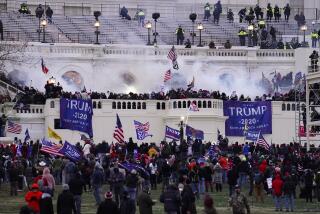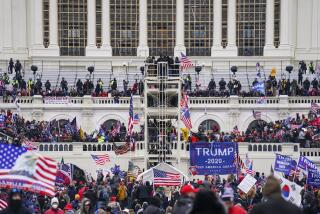Clinton Takes a Veiled Swipe at Dole on Militias
- Share via
BILLINGS, Mont. — President Clinton ventured into a stronghold of anti-federal government fervor Thursday to reaffirm his impassioned opposition to rightist militias--and took a barely veiled swipe at Senate Majority Leader Bob Dole for failing to take an equally outspoken stand.
“It’s very interesting to me to see that there are some public officials in our country who are only too happy to criticize the culture of violence being promoted by the media in our country or the rap lyrics that are coming out in some of our recordings . . . but are stone-cold silent when these other folks are talking and making violence seem like it’s OK,” Clinton said at a televised town meeting with citizens in Montana’s largest city.
He did not mention Dole by name, but a White House official said the President clearly had the Republican Kansas senator in mind. Dole made a major speech in Los Angeles Wednesday night condemning movies and rap lyrics “drenched in violence and sex.”
Dole condemned violent attacks on the federal government in the wake of the April 19 bombing of the federal building in Oklahoma City, but he has not criticized rightist groups’ angry rhetoric as strongly as Clinton has.
“If you want to disagree with the policy of the government, disagree with it,” Clinton said. “ . . . But do not condemn people who work for the government. That’s the kind of mentality that produced Oklahoma City.”
The President complained that “all these people out here in these various groups . . . are sending faxes around” encouraging “violent action against federal authorities. It is awful.”
Clinton’s comments on the militias were a renewal of the strong stand he took after the Oklahoma City bombing on violent rhetoric, an issue that moves him to unusual passion--and that has won him wide public support.
But his indirect criticism of Dole, widely regarded as his most likely opponent in next year’s presidential election, appeared likely to spark a new controversy over whether he is unduly politicizing the issue.
In April, Clinton criticized radio talk show hosts whom he called “purveyors of hatred”--but later sought to soften his remarks after Rush Limbaugh and other radio personalities complained.
Striking another defiant note, Clinton said he will fight to keep the ban on assault weapons he pushed through Congress last year, even though it is unpopular in rural states like Montana. White House aides say the assault-gun ban wins Clinton votes in the nation’s key suburban electoral battlegrounds, votes that outweigh any losses he may suffer in the sparsely populated mountain states.
At the same time, Clinton delivered a plea to the voters of the vast region that stretches from the Sierra Nevada across the Rockies: He never meant to start a “war on the West,” as opponents dubbed his policies on federal land use and the environment, and he’s more than ready to make peace.
“If I had been trying to wage war on the West, I don’t think the West would have done as well as it has,” he said in an interview with the Billings Gazette. “And . . . most of the environmental groups don’t think I’ve been [tough] enough.”
Clinton said that Republican attacks on his Administration for trying to raise grazing fees for ranchers using federal lands have been unfair because he reversed that policy.
*
“The Interior Department made a mistake,” he said. “They proposed as a negotiating strategy raising the grazing fees too high in 1993. It was wrong. But after strenuous objection by a number of people . . . we immediately dropped it--immediately. That should have been evidence that we weren’t trying to wage war on anybody out here.”
Clinton said that he still wants to change the mining law of 1872 that allows miners to extract minerals from federal lands for royalty payments far below market value, “but I don’t think we should do it to the extent that we put people out of business.”
As for timber issues, he said: “The truth is that the timber people ought to be for me. . . . We are giving landowners, especially small landowners, more flexibility. . . . I am trying to get it where these folks can log again.”
He pointed to an Interior Department decision last month, made under pressure from Congress, to relax restrictions on logging of salvage timber on U.S. Forest Service lands. And he said that he had sought a quick resolution of court cases on logging old growth forests in Northern California, Oregon and Washington “so we can do what we can to preserve the forest but so we can get people logging again.”
Clinton told the town meeting at KTVQ, Billings’ CBS affiliate, that he still wants to cooperate with the Republican-led Congress on the budget and other issues, but he is losing heart.
“Here I am, all dressed up and ready to cooperate,” he said. “[But] it takes two to tango.”
Many of Clinton’s questioners were sympathetic, and none espoused the violently anti-federal views of the militia movement.
KTVQ News Director Jon Stepanek said he hoped to include some militia members in the audience, but none of the more than 400 Montanans who applied openly proclaimed adherence to one of the rightist groups. “We wanted to bring that point of view forward,” Stepanek said. “It’s a big issue here.”
Clinton deliberately chose to visit Billings on a two-day swing through the mountains because it is both a center of militia activity--and it has organized a strong civic movement to oppose hate crimes.
But aides acknowledge that the trip was also inspired by the prospect of next year’s presidential election. “The main purpose is to tell people why Clinton should win the West,” White House Press Secretary Mike McCurry said.
Still, Billings’ status as a center for the Militia of Montana, one of the largest armed rightist networks in the nation, gave aides some qualms. An extra-heavy team of Secret Service agents flew in ahead of the President and enlisted local police and sheriffs to plan security for the visit.
In any event, militia leaders said they decided to stay out of Clinton’s way. “I’ve told everybody to get out of town,” said M. J. (Red) Beckman, Billings’s most prominent anti-government militant. In an interview, Beckman said he worried that federal government agents might assassinate Clinton during the visit “and blame it on the patriots.”
“What better place for the CIA, or whoever killed [President John F.] Kennedy, to do it again?” he asked.
Beckman said he and other militia sympathizers believe forces within the federal government planted the Oklahoma City bomb “to make a scapegoat of the militias.”
“I have no time for this turkey Clinton anyway,” he said. “He’s going to be the first President ever to leave office and go directly to jail. Some of us think he and [Atty. Gen.] Janet Reno should be tried and hanged for the murders at Waco,” where more than 80 members of the Branch Davidian religious community died in a fire as federal agents attacked their compound in 1993.
“But I think they deserve a worse punishment,” he said. “Before they’re hanged, they should have to spend a year together in prison.”
That was a joke, Beckman explained. “There’s a lot of humor in the patriot movement,” he said. “It’s healthy.”
More to Read
Get the L.A. Times Politics newsletter
Deeply reported insights into legislation, politics and policy from Sacramento, Washington and beyond. In your inbox twice per week.
You may occasionally receive promotional content from the Los Angeles Times.











